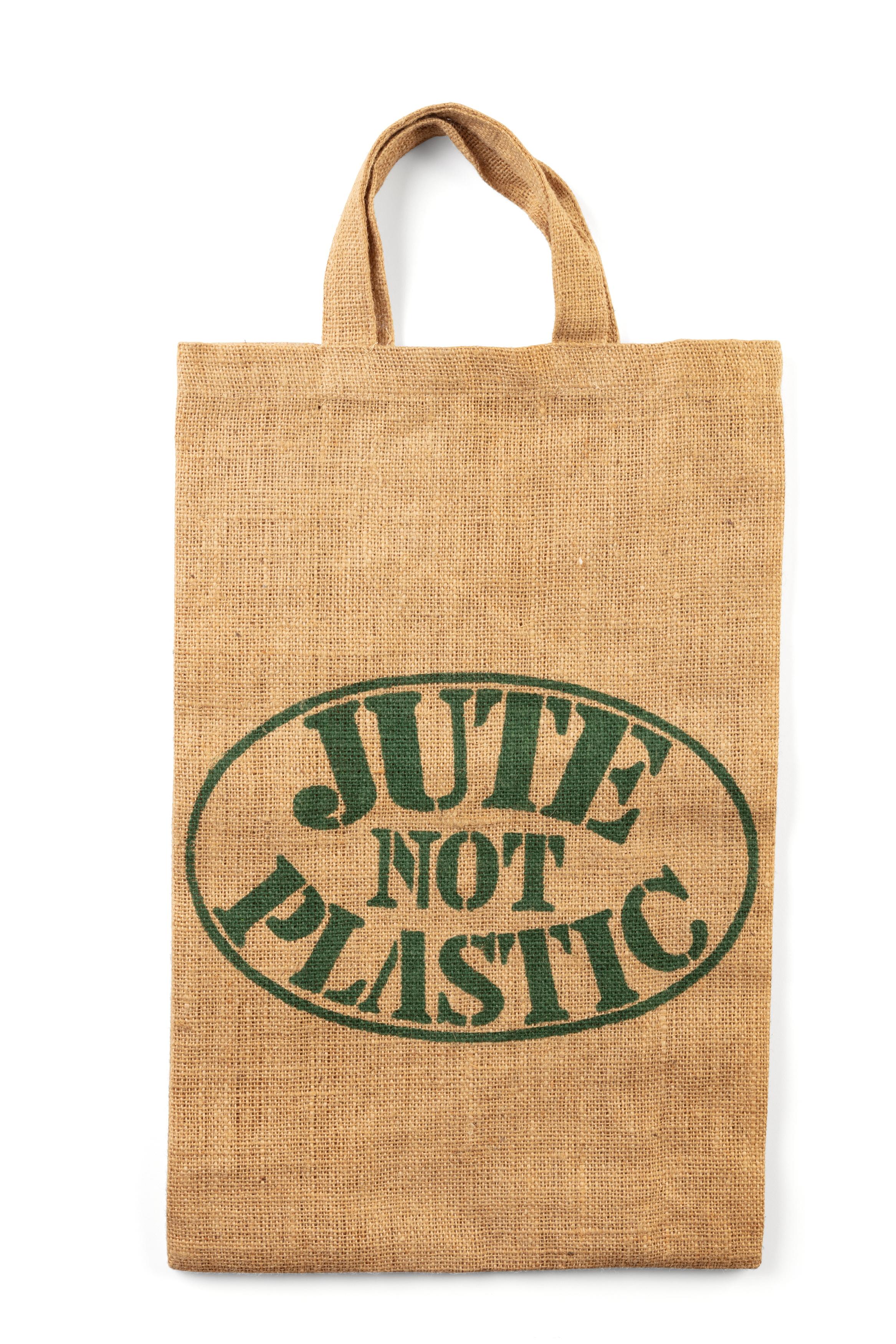'Jute not Plastic' shopping bag by CORR - The Jute Works
Object No. 90/977
As Australians became aware that the use and disposal of millions of plastic bags each year has severe environmental consequences, some people returned to using sturdy shopping bags made of natural materials, which had been the norm for generations. This created a market for poor Bangladeshi women to sell jute shopping bags like this one to rich Australians. Such bags were later largely superseded by sturdy bags made of polypropylene. These bags are often green in colour to suggest that they are environmentally innocuous, and they are either cheap to buy or given away as promotional products. While they certainly last longer than flimsy single-use plastic bags, shoppers often fill them with items that are wrapped in such bags. Many of these flimsy bags end up in the ocean, where they cause problems for sea creatures and the marine environment. The sturdy plastic bags will eventually be disposed of; while some will be recycled, many will add to the burden of undegradable material in landfill. Jute bags, in contrast, last well and then degrade totally in home compost heaps or communal landfill. People who buy bags like this one, knowing they are helping improve the lot of poor people in third-world countries, might also be thoughtful about their use and disposal of flimsy plastic bags (or they might not). They might be committed to the concept of fair trade and buy other goods that are accredited by the World Fair Trade Organization, which promotes self-determination and sustainable development as well as economic empowerment. Different types of shopping bags cannot be fairly compared without understanding the behaviour of their users, just as they cannot be compared without considering all the inputs to their manufacture and distribution and all the effects of their disposal. A jute shopping bag might seem like a simple object, but it is not simply a fashion accessory or a means of carrying goods. Debbie Rudder, Curator, 2012
Loading...
Summary
Object Statement
Shoppin bag, 'Jute not Plastic', natural, jute, CORR - The Jute Works, Bangladesh, 1989-1990
Physical Description
Bag, shopping, jute, CORR - The Jute Works, Bangladesh, 1989-1990 This large rectangular carry bag is made of woven undyed jute. It is gusseted at the sides and two short woven jute handles are attached at centre top. On one side, the words JUTE NOT PLASTIC have been stencilled inside an ellipse using olive green ink or paint.
DIMENSIONS
Width
199 mm
PRODUCTION
Notes
A swing tag that was attached to the bag bears the following words: 'Hand made for you by a village woman in Bangladesh, a very beautiful but economically poor Asian country, from a network of cooperative-like village groups for justice and self-help, through CORR - THE JUTE WORKS, a non-profit Women's Handicraft Marketing Trust.' This Trust was set up by the Roman Catholic Church in 1973 to provide training, work and incomes for war widows and other women impoverished by war. CORR stands for Christian Organization for Relief and Rehabilitation, and the acronym has been retained by The Jute Works even though CORR was renamed Caritas in 1976. The Trust is accredited by the World Fair Trade Organization.
HISTORY
Notes
The bag was purchased by the donor from an Australian Conservation Foundation stall at Balmain in 1990 and was used for its intended purpose for a short time.
SOURCE
Credit Line
Gift of John Baylis, 1990
Acquisition Date
26 October 1990

Copyright for the above image is held by the Powerhouse and may be subject to third-party copyright restrictions. Please submit an Image Licensing Enquiry for information regarding reproduction, copyright and fees. Text is released under Attribution-Non Commercial-No Derivative licence.
Image Licensing Enquiry
Object Enquiry

